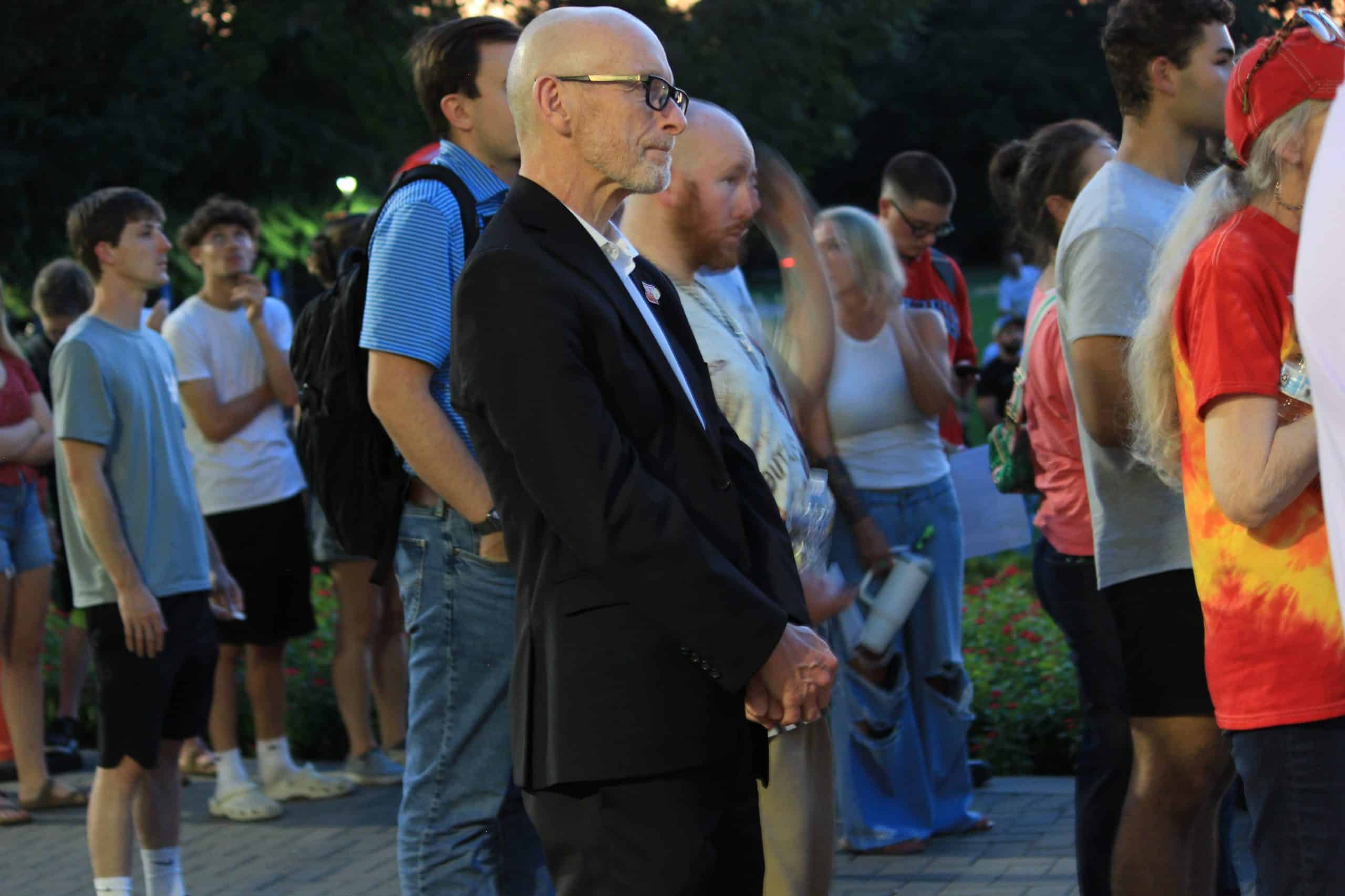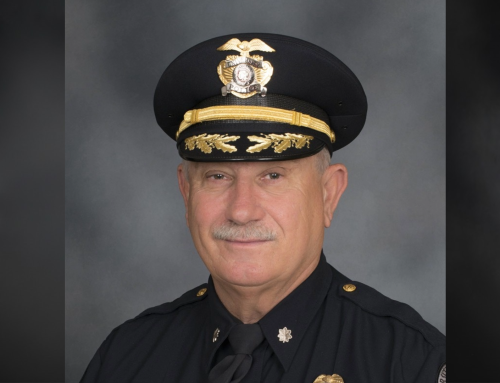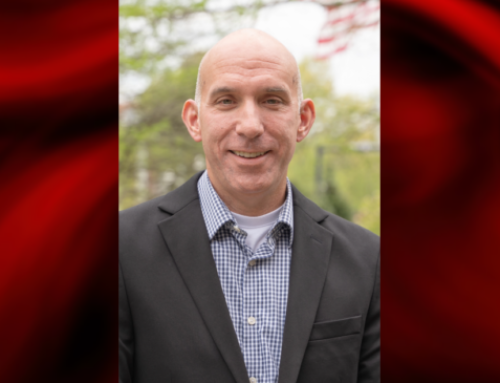By Josie Simpson
President Gerry Bradley sat down on Sept. 16 to discuss the University of Louisville’s 2025–2026 Strategic Plan, campus developments and student-focused initiatives.
Strategic Plan and Goals
When asked which pillar of the strategic plan he was most excited about, Bradley pointed to the Learn pillar. His goal is to grow enrollment while strengthening academic rigor. He wants the university to stand out in both national and international rankings.
“Ultimately, we want to be a true destination school—a place students aspire to be part of,” said Bradley.
Bradley also said one of his key opportunities is ensuring every student has access to a paid internship. To expand internships, he has been working with businesses across the city, the Commonwealth, and the Indiana Chamber of Commerce.
Beyond that, he wants graduates to stay and contribute to the region. He wants to provide them with work experiences while they are here.
“Our responsibility extends beyond the four years students spend on campus. We want to support their lifelong success, nurture their commitment to learning, and encourage them to remain engaged alumni.”
Navigating House Bill 4 and Campus Inclusion
Bradley said House Bill 4 has strained the university.
Financial pressure, he explained, is the greatest barrier to students, regardless of background. He acknowledged that this approach is less targeted, but ensures all students succeed.
“We’re very mindful of the impact these changes may have. We’ll continue analyzing the data to ensure we keep moving forward rather than backward,” said Bradley.
The university recently launched a Climate, Culture, and Belonging committee. This committee aims to determine the best way to help all faculty, staff, and students.
“Belonging is central to student success, and we want to make sure every member of our community feels valued and equipped to thrive.”
Bradley was also presented with a quote by Owen Otokiti from a past story about how the changes from House Bill 4 have impacted him.
“I have seen the names of certain organizations and buildings change, for example, the building I am in now used to be called the Cultural Center, but now it is called the Center for Belonging, Access, and Engagement. The language of many awards and scholarships has changed, too. It is a bit concerning because I feel like the university is not fighting back on something that is so detrimental to minority communities,” said Owen Otokiti.
Bradley said most of these changes were about complying with the law. He also clarified that the center still exists, just under a new name: the Center for Belonging, Access & Engagement. Furthermore, the name change was an internal decision by people in that center to make it broader and not exclude anyone.
“I understand where the student is coming from. I think that nobody, we certainly didn’t, wanted to do this. The bill was the bill, and we did everything we did to comply, and we will comply with the law,” said Bradley. “But I still think that the work continues, in a broader way.”

From left, Kathryn Cardarelli, University of Louisville interim provost, and U of L president Gerry Bradley discuss the university’s strategic plan draft with faculty members in Strickler Hall, Aug. 28, 2025. The draft marks the university’s first iteration of goals since the two were promoted in the spring semester of 2025. (Photo by Jai’Michael Anderson, The Louisville Cardinal)
Budget Cuts and Financial Position
When it came to budget cuts for a program like TRIO, Bradley said it was not related to House Bill 4. Those cuts were made to better the financial position of the university. The university builds a zero-balanced budget every year, which leads to ‘tough decisions about priorities’.
“Those decisions are difficult, but we take them very seriously and try to handle them as transparently as possible,” he said.
U of L’s position compared to other institutions across the country is in better financial shape. He said many institutions are facing enrollment declines and having to make major cuts, like layoffs, downsizing, or even closing programs.
Campus Safety and RAVE Alerts
Bradley and Interim Vice President of Communications and Marketing John Karman also touched on the concern over RAVE alerts, or rather, the lack thereof.
Karman said no RAVE alert was sent after a student held a faculty member at knifepoint since he was quickly apprehended.
“There was no ongoing threat and therefore no alert was sent,” said Karman.
He assured students that the university continues to review the system to ensure they are following best practices.
When it came to reports that four rapes had occurred on campus since school began, Bradley said that was not the case. He said he had spoken with the university police chief the day before, and those incidents were not rapes, but assaults.
“The nature of each assault can vary, but they were not officially classified as rape,” said Bradley.
However, the UofL Belknap Campus Clery Report still classifies the incidents as rape.
Campus Development
Bradley addressed a large misconception that the new parking lot where the Cardinal Center was located is permanent.
“That’s not the case—it’s temporary,” said Bradley.
He explained that he had to decide whether leaving it as a green space was the most practical decision. The high demand for parking was too apparent to deny, so he put that space to use.
The space would likely stay empty for a year, but the university plans to build a dorm, possibly with an underground garage.
“The priority is developing the property in ways that support our students.”
Integrating Artificial Intelligence
Bradley also discussed the university’s plans to integrate artificial intelligence into the curriculum and broader university operations.
He explained that he has been in discussions with the College of Business about developing AI modules for students and faculty.
“Given how quickly AI is transforming industries, it’s essential that we prepare our community to understand and use these tools effectively,” He said.
Bradley noted the university is considering implementing AI into the Cardinal Core. Also, he is encouraging faculty to be proactive in developing new initiatives around AI for teaching and research.
“The goal is to position the university as a leader in this space, ensuring that our students, staff, and faculty are well-prepared for the future.”
Athletics, NIL, and Student Fees
Bradley said the new lottery system and athletic fee resulted from the NIL settlement agreement. That deal left a $22 million annual gap that the university now has to cover. The maximum amount of money that could be made up through the new $200 athletic fee was still only $5 to $6 million.
Compared to other ACC school fees, Bradley said, “we’re still well below the average—not just a little, but significantly.”
The remainder of the $22 million gap was modeled for a successful season. He explained that the revenue the athletics program brings to U of L is based on advancement in tournaments.
“We have confidence in our programs and coaches—men’s and women’s basketball, volleyball, and others,” he said.
Supporting U of L’s athletes is incredibly important to him, Bradley added. “Our athletes are students too, and they bring a lot of recognition to the university—both nationally and globally. So, it’s a price we felt was necessary.”
Dining Decisions and Student Input
Students have raised concerns about being left out of decisions, such as when Subway replaced Wendy’s in the Student Activities Center.
Bradley said this is not the case. He has been working with SGA President Macy Waddle to schedule more listening sessions with students.
“We try to be visible and accessible, and while not everyone can be part of every decision, we do include student government, faculty, and staff in the process and take suggestions seriously.”
Bradley explained that the Subway/Wendy’s decision came from an agreement with Aramark, which implements the most profitable options. “In those cases, we might not have full control, but we want to communicate clearly why we made certain decisions, especially if students feel they didn’t get a chance to weigh in.”
Supporting Campus Community

U of L President Gerry Bradley attends the Charlie Kirk vigil outside Grawemeyer Hall Sept. 15, 2025. (Photo by Alex Woodard / The Louisville Cardinal)
Bradley said his biggest challenge as president has been dealing with outside events, such as the murder of Charlie Kirk.
“These [events] bring a lot of real anxiety onto campus,” he said.
To help students remain focused on their education, he said he does what he can to give them peace of mind. Recently, he attended a vigil held in Charlie Kirk’s honor on Sept. 15. His reason was to show support for those grieving. He also shared that he attended the DEI march six months ago, when House Bill 4 was first passed, to be present for the community.
“This is a place where true dialogue should happen.”
Measuring Success as President
When it came to how Bradley would measure the success of his presidency, he said, “Action speaks louder than words and results speak louder than action.”
Bradley said if he leaves this role and the university is in a better place, it will reflect the work of everyone in the administration and community, not just him. He plans to use his role to support the new strategic plan over the course of his presidency.
“Some things are outside our control, but right now, our focus is on what we can control and improving the university every day.”






